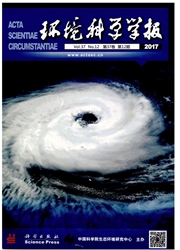

 中文摘要:
中文摘要:
土壤环境微界面是土壤组分(矿物和有机质)、植物根系、微生物等微界面的集合体和动态变化的连续体.土壤胶体微界面可理解为土壤固/液界面的双电层结构.这些动态变化的异质微界面,按其表面结构特点可分为硅氧烷型表面、水合氧化物型表面和有机物表面.环境污染物在土壤胶体微界面的迁移转化是污染物在土壤固-液界面反应的动态平衡过程,包括吸附/解吸、沉淀/溶解、络合/螯合、氧化/还原等反应.植物根际是植物与土壤组分和微生物相互作用的活跃区域,根际微界面决定着污染物向植物根系的运输、植物吸收及转运,为污染物经土壤向食物链传递的主要通道.根际微生物在重金属离子的吸附和氧化、还原、转化,以及有机污染物的降解和转化中起重要作用.这些异质微界面相互关联、相互作用,在土壤环境中构成微界面的连续体,决定着污染物在土壤环境中的赋存形态、生物有效性和向其它环境介质(如水体和植物)的迁移,因而在土壤污染控制和污染土壤修复中具有特别重要的意义.土壤环境微界面过程的研究已成为环境科学的研究前沿,值得引起土壤环境科学工作者的重视,并进行系统而深入的研究.
 英文摘要:
英文摘要:
Soil environmental micro-interfaces are of a collection and a continuum of surfaces of soil clay minerals, oxides, organic matters, plant roots and microbes. The soil colloidal interfaces could be simply described as a diffuse electrical double-layer structure on the interface of soil particles and solutions. These heterogeneous micro-interfaces can be divided into three types based on their surface structure characterizations: siloxane, hydrous oxide and organic matter surfaces. The transport, transformation and degradation of pollutants in the soil are dynamic processes, including a series of reactions of sorption/ desorption, precipitation/ dissolution, complexation/ chelation, and oxidation/ reduction. Rhizosphere interface is the most active area in soil-plant ecosystems with intensive interactions among soil particles, organic compounds, plant roots and microorganisms. It is the channel of pollutant transporting to plants and linking with food chain. Microbial interface plays important roles not only in sorption and redox reactions of heavy metals, but also degradation and transformation of organic pollutants. As a dynamic continuum, different soil heterogeneous micro-interfaces interact with each other and control the forms, bioavailability, toxicity and transport of pollutants in soil-plant ecosystems. Therefore, they are of significance in soil pollution control and soil remediation, and deserve intensive investigations.
 同期刊论文项目
同期刊论文项目
 同项目期刊论文
同项目期刊论文
 Craig Adams . Determination of endocrine disrupting chemicals in the liquid and solid phases of acti
Craig Adams . Determination of endocrine disrupting chemicals in the liquid and solid phases of acti Optimized coagulation on a municipal wastewater treatment: Competitive and synergetic effect among d
Optimized coagulation on a municipal wastewater treatment: Competitive and synergetic effect among d Online investigation on ozonation products of pyrene and benz[a]anthracene particles with a vacuum u
Online investigation on ozonation products of pyrene and benz[a]anthracene particles with a vacuum u Comparison of archaeal and bacterial community structures in heavily oil-contaminated and pristine s
Comparison of archaeal and bacterial community structures in heavily oil-contaminated and pristine s Effects of calcium ions on surface characteristics and adsorptive properties of hydrous manganese di
Effects of calcium ions on surface characteristics and adsorptive properties of hydrous manganese di Study of a combined heterotrophic and sulfur autotrophic denitrification technology for removal of n
Study of a combined heterotrophic and sulfur autotrophic denitrification technology for removal of n Determination of optimum operating conditions for production of polyhydroxybutyrate by activated slu
Determination of optimum operating conditions for production of polyhydroxybutyrate by activated slu Removal of endocrine disrupting chemicals during ozonation of municipal sewage with brominated by-pr
Removal of endocrine disrupting chemicals during ozonation of municipal sewage with brominated by-pr Christopher WK Chow. Enhanced coagulation for high alkalinity and micro- polluted water: The third w
Christopher WK Chow. Enhanced coagulation for high alkalinity and micro- polluted water: The third w Change of bacterial communities in sediments along Songhua River in Northeastern China after a nitro
Change of bacterial communities in sediments along Songhua River in Northeastern China after a nitro Design of BDD-TiO2 Hybrid Electrode with P-N Function for Photoelectroatalytic Degradation of Organi
Design of BDD-TiO2 Hybrid Electrode with P-N Function for Photoelectroatalytic Degradation of Organi Relative importance of hydrolyzed Al(III) species during coagulation with PACl: A case study with th
Relative importance of hydrolyzed Al(III) species during coagulation with PACl: A case study with th Effect of liquid property on adsorption and catalytic reduction of nitrate over hydrotalcite-support
Effect of liquid property on adsorption and catalytic reduction of nitrate over hydrotalcite-support Effect of preozonation on the characteristic transformation of fulvic acid and its subsequent trichl
Effect of preozonation on the characteristic transformation of fulvic acid and its subsequent trichl Proportion of bromo-DBPs in total DBPs during reclaimed-water chloration and its related influencing
Proportion of bromo-DBPs in total DBPs during reclaimed-water chloration and its related influencing Characterization and Reactivity of MnOx Supported on Mesoporous Zirconia for Herbicide 2,4-D Mineral
Characterization and Reactivity of MnOx Supported on Mesoporous Zirconia for Herbicide 2,4-D Mineral Simultaneous determination of sulfonamides, tetracyclines and tiamulin in swine wastewater by solid-
Simultaneous determination of sulfonamides, tetracyclines and tiamulin in swine wastewater by solid- Abundance and community composition of methanotrophs in a Chinese paddy soil under long-term fertili
Abundance and community composition of methanotrophs in a Chinese paddy soil under long-term fertili Microwave electrodeless lamp assisted catalytic degradation of X-GRL with manganese dioxides: Adsorp
Microwave electrodeless lamp assisted catalytic degradation of X-GRL with manganese dioxides: Adsorp Synergistic effect and mechanism between SO2 and NO 2 in their adsorption and reaction on gamma-alum
Synergistic effect and mechanism between SO2 and NO 2 in their adsorption and reaction on gamma-alum Nitrobenzene biodegradation ability of microbial communities in water and sediments along the Songhu
Nitrobenzene biodegradation ability of microbial communities in water and sediments along the Songhu Removal of disinfection by-products precursors by polyaluminum chloride coagulation coupled with chl
Removal of disinfection by-products precursors by polyaluminum chloride coagulation coupled with chl CuFe2O4/activated carbon composite : A novel magnetic adsorbent for the removal of acid orange II an
CuFe2O4/activated carbon composite : A novel magnetic adsorbent for the removal of acid orange II an Long-term fertilization regimes affect bacterial community structure and diversity of an agricultura
Long-term fertilization regimes affect bacterial community structure and diversity of an agricultura Soil enzymatic activities and microbial community structure with different application rates of Cd a
Soil enzymatic activities and microbial community structure with different application rates of Cd a Microbial composition and diversity of an upland red soil under long-term fertilization treatments a
Microbial composition and diversity of an upland red soil under long-term fertilization treatments a Abundance and composition of ammonia-oxidizing bacteria and ammonia-oxidizing archaea communities of
Abundance and composition of ammonia-oxidizing bacteria and ammonia-oxidizing archaea communities of Quantitative analyses of the abundance and composition of ammonia-oxidizing bacteria and ammonia-oxi
Quantitative analyses of the abundance and composition of ammonia-oxidizing bacteria and ammonia-oxi 期刊信息
期刊信息
